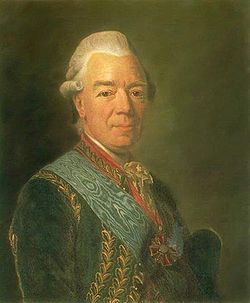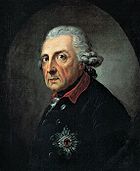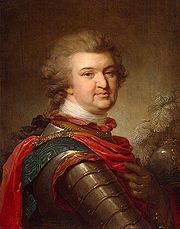
Zakhar Tchernyshov
Encyclopedia

Ivan Tchernyshov
Count Ivan Grigoryevich Chernyshyov was a Russian Field Marshal and General Admiral, prominent during the reign of Empress Catherine the Great.-Life and career:...
, and Pyotr Tchernyshov, close friends of Timofei Evreinov, and the sons of Grigory Chernyshev, the first count Chernyshev and one of Peter the Great's generals, enlisted in the Russian military service since 1735.
It was Evreinov, in the service of Empress Elisabeth, who squarely warned around the period 1745–1746 the 16-year-old German-born married lady Sophie Friederike Auguste von Anhalt-Zerbst-Dornburg, later Dowager Empress Catherine II of Russia
Catherine II of Russia
Catherine II, also known as Catherine the Great , Empress of Russia, was born in Stettin, Pomerania, Prussia on as Sophie Friederike Auguste von Anhalt-Zerbst-Dornburg...
, about the rumours about her at the Imperial Court, then, candid and innocent mixings with the Tchernysov siblings, particularly Zakhar, the eldest.
Timofei Evreinov talked about the convenience for Zakhar, then around 23 years old, of leaving the Court pretexting to be busy with the Army and let alone the 16-year-old married lady.
Therefore, Evreinov pressed for Zakhar undertaking, between other things, a diplomatic mission to Vienna
Vienna
Vienna is the capital and largest city of the Republic of Austria and one of the nine states of Austria. Vienna is Austria's primary city, with a population of about 1.723 million , and is by far the largest city in Austria, as well as its cultural, economic, and political centre...
. Moreover the married young German lady, later to become a brilliant and militarily aggressive Empress, was closely monitored in her behavior by the Imperial Grand Chancellor Aleksei Petrovich Bestuzhev-Ryumin
Aleksei Petrovich Bestuzhev-Ryumin
Count Alexey Petrovich Bestuzhev-Ryumin , Grand Chancellor of Russia, was one of the most influential and successful European diplomats of the 18th century. He was chiefly responsible for Russian foreign policy during the reign of Empress Elizaveta Petrovna.-Early life and career:Alexey was born...
(Алексе́й Петро́вич Бесту́жев-Рю́мин) (June 1, 1693 – April 21, 1768), Grand Chancellor of Russia, and closely watched over by Empress Elizabeth's cousin, Maria Choglokova, aged 24 but already with seven children.
After a period back at court, 38-year-old Zakhar held the command of a Russian corps of approximately 20,000 soldiers who took part in the Raid on Berlin
Raid on Berlin
The Raid on Berlin took place in October 1760 during the Seven Years' War when Austrian and Russian forces occupied the Prussian capital of Berlin for several days. After raising money from the city, and with the approach of further Prussian reinforcements, the occupiers withdrew...
which briefly saw Austro-Russian forces capture the Prussian capital in 1760, during the very bloody and extensive European War (over 1 million deaths), known as Seven Years' War
Seven Years' War
The Seven Years' War was a global military war between 1756 and 1763, involving most of the great powers of the time and affecting Europe, North America, Central America, the West African coast, India, and the Philippines...
, (1756–1763).
It enveloped both European and colonial theatres from 1756 to 1763, incorporating the Pomeranian War
Pomeranian War
The Pomeranian War was a theatre of the Seven Years' War. The term is used to describe the fighting between Sweden and Prussia between 1757 and 1762 in Swedish Pomerania, Prussian Pomerania, northern Brandenburg and eastern Mecklenburg-Schwerin....
and the French and Indian War
French and Indian War
The French and Indian War is the common American name for the war between Great Britain and France in North America from 1754 to 1763. In 1756, the war erupted into the world-wide conflict known as the Seven Years' War and thus came to be regarded as the North American theater of that war...
which was fought from 1754 to 1763.
In this underestimated in these days war, Prussia
Prussia
Prussia was a German kingdom and historic state originating out of the Duchy of Prussia and the Margraviate of Brandenburg. For centuries, the House of Hohenzollern ruled Prussia, successfully expanding its size by way of an unusually well-organized and effective army. Prussia shaped the history...
, the Electorate Brunswick-Lüneburg
Brunswick-Lüneburg
The Duchy of Brunswick-Lüneburg , or more properly Duchy of Brunswick and Lüneburg, was an historical ducal state from the late Middle Ages until the late Early Modern era within the North-Western domains of the Holy Roman Empire of the German Nation, in what is now northern Germany...
, and Great Britain
Great Britain
Great Britain or Britain is an island situated to the northwest of Continental Europe. It is the ninth largest island in the world, and the largest European island, as well as the largest of the British Isles...
(including British colonies in North America, the British East India Company
British East India Company
The East India Company was an early English joint-stock company that was formed initially for pursuing trade with the East Indies, but that ended up trading mainly with the Indian subcontinent and China...
, and Ireland
Ireland
Ireland is an island to the northwest of continental Europe. It is the third-largest island in Europe and the twentieth-largest island on Earth...
), were pitted against Austria
Austria
Austria , officially the Republic of Austria , is a landlocked country of roughly 8.4 million people in Central Europe. It is bordered by the Czech Republic and Germany to the north, Slovakia and Hungary to the east, Slovenia and Italy to the south, and Switzerland and Liechtenstein to the...
, France
France
The French Republic , The French Republic , The French Republic , (commonly known as France , is a unitary semi-presidential republic in Western Europe with several overseas territories and islands located on other continents and in the Indian, Pacific, and Atlantic oceans. Metropolitan France...
(including the North American colony of New France
New France
New France was the area colonized by France in North America during a period beginning with the exploration of the Saint Lawrence River by Jacques Cartier in 1534 and ending with the cession of New France to Spain and Great Britain in 1763...
and the French East India Company
French East India Company
The French East India Company was a commercial enterprise, founded in 1664 to compete with the British and Dutch East India companies in colonial India....
), the Russian Empire
Russian Empire
The Russian Empire was a state that existed from 1721 until the Russian Revolution of 1917. It was the successor to the Tsardom of Russia and the predecessor of the Soviet Union...
, Sweden
Sweden
Sweden , officially the Kingdom of Sweden , is a Nordic country on the Scandinavian Peninsula in Northern Europe. Sweden borders with Norway and Finland and is connected to Denmark by a bridge-tunnel across the Öresund....
, and Saxony
Saxony
The Free State of Saxony is a landlocked state of Germany, contingent with Brandenburg, Saxony Anhalt, Thuringia, Bavaria, the Czech Republic and Poland. It is the tenth-largest German state in area, with of Germany's sixteen states....
.
Portugal
Portugal
Portugal , officially the Portuguese Republic is a country situated in southwestern Europe on the Iberian Peninsula. Portugal is the westernmost country of Europe, and is bordered by the Atlantic Ocean to the West and South and by Spain to the North and East. The Atlantic archipelagos of the...
(on the side of Great Britain and Prussia), and Spain
Spain
Spain , officially the Kingdom of Spain languages]] under the European Charter for Regional or Minority Languages. In each of these, Spain's official name is as follows:;;;;;;), is a country and member state of the European Union located in southwestern Europe on the Iberian Peninsula...
(on the opposite side, France, the Russian Empire, Sweden and Saxony between others), were later drawn into the conflict, and a force from the neutral Netherlands
Netherlands
The Netherlands is a constituent country of the Kingdom of the Netherlands, located mainly in North-West Europe and with several islands in the Caribbean. Mainland Netherlands borders the North Sea to the north and west, Belgium to the south, and Germany to the east, and shares maritime borders...
was attacked in India
India
India , officially the Republic of India , is a country in South Asia. It is the seventh-largest country by geographical area, the second-most populous country with over 1.2 billion people, and the most populous democracy in the world...
.
Zakhar rose to become Minister of War to her formerly inexperienced female mate, the empress Catherine the Great
Catherine II of Russia
Catherine II, also known as Catherine the Great , Empress of Russia, was born in Stettin, Pomerania, Prussia on as Sophie Friederike Auguste von Anhalt-Zerbst-Dornburg...
of Russia
Russia
Russia or , officially known as both Russia and the Russian Federation , is a country in northern Eurasia. It is a federal semi-presidential republic, comprising 83 federal subjects...
. He left no children and the Tchernyshov majorat
Majorat
Majorat is the right of succession to property according to age . A majorat would be inherited by the oldest son, or if there was no son, the nearest relative. This law existed in some of the European countries and was designed to prevent the distribution of wealthy estates between many members of...
, instituted by him, passed to a younger brother.

Peter III of Russia
Peter III was Emperor of Russia for six months in 1762. He was very pro-Prussian, which made him an unpopular leader. He was supposedly assassinated as a result of a conspiracy led by his wife, who succeeded him to the throne as Catherine II.-Early life and character:Peter was born in Kiel, in...
, formerly Duke of Holstein, formerly elected King of Sweden by the Swedish Parliament, former King of Finland by his aunt decision, the Russian Empress, soon to be assassinated after only 6 months of being "promoted" to new Emperor of Russia, he received instructions (May 1762) to join his forces with the former enemies, the Prussia
Prussia
Prussia was a German kingdom and historic state originating out of the Duchy of Prussia and the Margraviate of Brandenburg. For centuries, the House of Hohenzollern ruled Prussia, successfully expanding its size by way of an unusually well-organized and effective army. Prussia shaped the history...
ns.
Along with Frederick II of Prussia
Frederick II of Prussia
Frederick II was a King in Prussia and a King of Prussia from the Hohenzollern dynasty. In his role as a prince-elector of the Holy Roman Empire, he was also Elector of Brandenburg. He was in personal union the sovereign prince of the Principality of Neuchâtel...
, (January 24, 1712 – August 17, 1786), Chernyshov came upon the formerly allied Austria
Austria
Austria , officially the Republic of Austria , is a landlocked country of roughly 8.4 million people in Central Europe. It is bordered by the Czech Republic and Germany to the north, Slovakia and Hungary to the east, Slovenia and Italy to the south, and Switzerland and Liechtenstein to the...
n forces of Field Marshal Daun
Leopold Josef Graf Daun
Count Leopold Joseph von Daun , later Prince of Thiano, Austrian field marshal, was born at Vienna, as son of Count Wirich Philipp von Daun.- Background :...
near Burkersdorf.

King Frederick had already decided to attack the Austrians when Chernyshev received orders to disengage from the Prussians. But at Frederick's request the Russian commander suppressed the order and participated in the Prussian victory of Burkersdorf
Battle of Burkersdorf
The Battle of Burkersdorf was a battle fought on July 21, 1762 during the Seven Years' War. A Prussian army of 40,000 men fought an Austrian army of around 30,000 men....
(21 July 1762).
Once brief Emperor Peter III was assassinated, his German born wife Sophia, now Catherine the Great, in such a way that some 10 years later Chernyshev, already in his early fifties, became President of the War College (1773) and an Imperial Field Marshal
Field Marshal
Field Marshal is a military rank. Traditionally, it is the highest military rank in an army.-Etymology:The origin of the rank of field marshal dates to the early Middle Ages, originally meaning the keeper of the king's horses , from the time of the early Frankish kings.-Usage and hierarchical...
(1773).
His success as an administrator provoked the jealousy of almighty Ukrainian born Prince Potemkin, upon whose insistence Chernyshev was sent away to govern Belarus
Belarus
Belarus , officially the Republic of Belarus, is a landlocked country in Eastern Europe, bordered clockwise by Russia to the northeast, Ukraine to the south, Poland to the west, and Lithuania and Latvia to the northwest. Its capital is Minsk; other major cities include Brest, Grodno , Gomel ,...
, which had been snatched from Poland
Poland
Poland , officially the Republic of Poland , is a country in Central Europe bordered by Germany to the west; the Czech Republic and Slovakia to the south; Ukraine, Belarus and Lithuania to the east; and the Baltic Sea and Kaliningrad Oblast, a Russian exclave, to the north...
during the first partition
First Partition of Poland
The First Partition of Poland or First Partition of the Polish-Lithuanian Commonwealth took place in 1772 as the first of three partitions that ended the existence of the Polish-Lithuanian Commonwealth by 1795. Growth in the Russian Empire's power, threatening the Kingdom of Prussia and the...
several months prior to that.

He was responsible for the 1775 reform of the regional administration across the empire and became the first governor of the re-established Moscow
Moscow
Moscow is the capital, the most populous city, and the most populous federal subject of Russia. The city is a major political, economic, cultural, scientific, religious, financial, educational, and transportation centre of Russia and the continent...
guberniya
Guberniya
A guberniya was a major administrative subdivision of the Russian Empire usually translated as government, governorate, or province. Such administrative division was preserved for sometime upon the collapse of the empire in 1917. A guberniya was ruled by a governor , a word borrowed from Latin ,...
.

